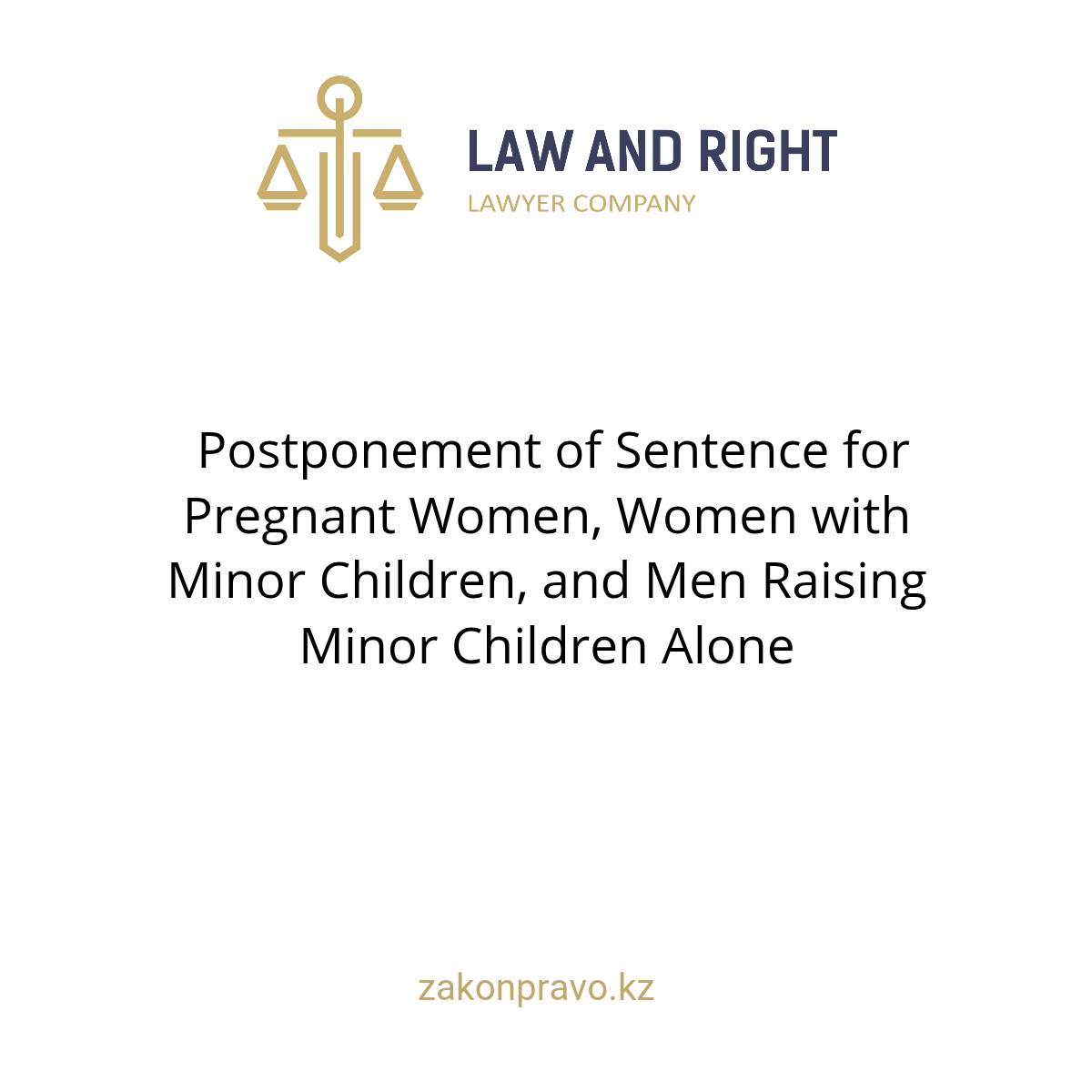Postponement of Sentence for Pregnant Women, Women with Minor Children, and Men Raising Minor Children Alone
🔹 1. Legal Nature and Purpose of the Article
Article 74 of the Criminal Code of Kazakhstan is aimed at:
· protecting the rights of the child;· ensuring humane treatment of pregnant women and parents of minor children;· implementing the principles of individualization of punishment and prioritization of family values.
It reflects the provisions of Article 27 of the Constitution of the Republic of Kazakhstan (on family and childhood) and international standards, primarily the UN Convention on the Rights of the Child (Articles 3 and 9).
🔹 2. Conditions for Granting Postponement
2.1. Categories Eligible for Postponement
Postponement may be granted to:
· Pregnant women — for up to 1 year;· Women with minor children — for up to 5 years, but no later than the child reaching 14 years of age;· Men raising minor children alone — likewise, for up to 5 years and no later than the child turning 14.
👉 The definition of a "minor child" is enshrined in Article 1 of the Law of the Republic of Kazakhstan "On the Rights of the Child" — up to 14 years old.
2.2. Exceptions — When Postponement Is Not Granted
Postponement is not granted if the person has been sentenced to more than 5 years of imprisonment for:
· serious or especially serious crimes against the person (e.g., murder, rape);· terrorist or extremist crimes;· crimes committed as part of a criminal group;· crimes against the sexual inviolability of minors.
📌 These restrictions align with the provisions on the inadmissibility of leniency for persons who committed especially dangerous crimes (see Article 15 of the Criminal Code).
🔹 3. Grounds and Procedure for Cancellation of Postponement
3.1. Grounds for Cancellation
The court may revoke the postponement if the person:
· abandoned the child;· neglects child-rearing duties;· violated public order twice, receiving written warnings from the probation control authority.
3.2. Procedure
The supervising body (Penal Enforcement System) submits a petition to the court. The court considers the issue in an open hearing with the participation of:
· the convicted person;· the prosecutor;· representatives of the supervisory body;· where necessary — child protection authorities.
🔹 4. Actions Upon Expiry of Postponement
Upon the expiration of the postponement period, the court decides one of the following:
1. Full exemption from punishment — if the conduct was impeccable;2. Substitution with a more lenient punishment (e.g., restriction of liberty, fine) — if there are mitigating circumstances;3. Execution of the original sentence — if there are no grounds for leniency.
🔹 5. Consequences of Committing a New Crime
If the convicted person commits a new crime during the postponement period, Article 60 of the Criminal Code applies: punishment is imposed by combination of sentences, i.e., more strictly.
🔹 6. Related Provisions in Other Codes and Laws
· Criminal Procedure Code of Kazakhstan:o Article 480 — procedure for execution of sentence;o Article 483 — participation of the prosecutor and interested bodies.
· Penal Enforcement Code of Kazakhstan (PEСK):o Article 168 — postponement of execution of sentence;o Article 169 — monitoring the behavior of persons granted postponement.
· Constitution of Kazakhstan — Article 27;· Law "On the Rights of the Child in the Republic of Kazakhstan" — Articles 10 and 21;· UN Convention on the Rights of the Child — Articles 3, 9, and 37.
🔹 7. Judicial Practice
📌 Example from Case Law (Hypothetical):A woman convicted of a medium-gravity crime, having a 2-year-old child, filed a request for postponement. Considering the absence of aggravating circumstances, a positive character reference, and the testimony of child welfare authorities, the court granted postponement for 5 years until the child reached age 7. The woman fulfilled her parental duties, and upon expiration, the court released her from punishment.
📌 Counterexample:A man raising a child alone received postponement but was twice held administratively liable for minor hooliganism. The probation authority filed a motion. The court revoked the postponement and ordered execution of the sentence.
🔹 8. International Standards
· UN Convention on the Rights of the Child (1989) — primarily Article 3 (best interests of the child shall be a primary consideration);· UN Rules for the Treatment of Women Prisoners and Non-custodial Measures for Women Offenders (Bangkok Rules) — recommend taking into account the needs of women and mothers when executing punishment;· European Court of Human Rights (ECtHR) — in several rulings, emphasized the priority of the child’s interests in sentencing parents.
🔹 9. Conclusion
Article 74 of the Criminal Code of Kazakhstan reflects a humane approach to specific categories of convicts. It:
· protects the interests of the child;· allows courts to individualize punishment enforcement;· promotes social adaptation and maintenance of parent-child bonds.
Its application requires balanced judicial discretion, an assessment of factual circumstances, and procedural safeguards to protect the interests of both the child and the state.
Attention!
Law and Law Law Law draws your attention to the fact that this document is basic and does not always meet the requirements of a particular situation. Our lawyers are ready to assist you in legal advice, drawing up any legal document suitable for your situation.
For more information, please contact a Lawyer / Attorney by phone: +7 (708) 971-78-58; +7 (700) 978 5755, +7 (700) 978 5085.
Attorney at Law Almaty Lawyer Legal Services Legal Advice Civil Criminal Administrative Cases Disputes Protection Arbitration Law Firm Kazakhstan Law Office Court Cases


